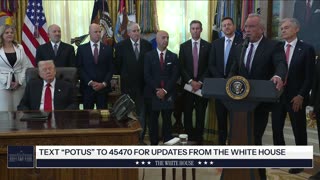Premium Only Content

Navigating ISF Filing for Temporary Imports: What You Need to Know
ISF Cargo | Phone: 786-865-0459
Email: [email protected] | https://isfcargo.com
The Importer Security Filing (ISF), also known as the 10+2 rule, is a requirement by the US Customs and Border Protection (CBP) to collect information on goods being shipped to the United States by ocean to enhance cargo security and increase shipment visibility. For goods imported for temporary purposes like trade shows or exhibitions, the need for ISF filing may depend on several factors.
Firstly, the duration of the temporary import plays a crucial role. If the goods are intended to be re-exported within a short period, usually within 60 days, ISF filing may be waived. However, if the goods will exceed the 60-day limit and remain in the United States for an extended period, ISF filing may be required.
Another factor to consider is whether a Customs bond is necessary for the temporary import. A Customs bond is a financial guarantee that ensures compliance with CBP regulations and covers any potential duties, taxes, or penalties. In some cases, a bond may be required for the temporary import, even if ISF filing is not.
Additionally, the CBP's risk assessment of the goods also plays a role in determining whether ISF filing is required. If the goods are deemed low-risk, the CBP may grant an exemption from ISF filing. However, the decision is subject to the discretion of CBP officers and is not guaranteed.
To navigate the complexities and potential exemptions related to ISF filing for temporary imports, it is advisable to consult with a licensed customs broker or an experienced trade professional. They can provide valuable guidance and ensure compliance with all customs regulations, including the ISF requirements.
In conclusion, whether ISF filing is required for goods imported for temporary purposes depends on various factors, including the duration of the import, the need for a Customs bond, and the CBP's risk assessment. To avoid confusion or potential non-compliance, it is best to consult with a customs broker who can effectively navigate these requirements.
#usimportbond #isfcustomsbroker #uscustomsclearing #isfentry
Video Disclaimer Here: This content is for educational use and not associated with any US government body.
00:34 - ISF Filing, also known as the 10+2 rule, is required by U.S. Customs and Border Protection for collecting information on goods shipped to the United States by ocean to enhance cargo security.
1:01 - ISF filing may not be required for goods imported for temporary purposes like trade shows or exhibitions if they will be re-exported within 60 days, but it depends on factors such as duration of the temporary import and the need for a Customs bond.
1:42 - A Customs bond may be necessary for temporary imports even if ISF filing is not required, and the decision to waive ISF filing for temporary imports depends on the risk assessment conducted by CBP.
2:25 - It is advisable to consult with a licensed customs broker or experienced trade professional to ensure compliance with all customs regulations, including ISF requirements, for goods imported for temporary purposes.
-
 1:01:46
1:01:46
Timcast
3 hours agoBannon RIPS GOP For Dismissing Zohran, "This Is Very Serious"
106K77 -
 2:12:18
2:12:18
Side Scrollers Podcast
4 hours agoSide Scrollers VTuber TAKE OVER with Kirsche, Rev Says Desu & DarlingStrawb | Side Scrollers
36.8K3 -
 LIVE
LIVE
StoneMountain64
2 hours agoArc Raiders is actually INCREDIBLE
97 watching -
 2:03:04
2:03:04
MattMorseTV
4 hours ago $0.74 earned🔴Trump’s EMERGENCY Oval Office ANNOUNCEMENT.🔴
58.3K62 -
 LIVE
LIVE
GrimmHollywood
5 hours ago🔴LIVE • GRIMM HOLLYWOOD and BIG TALL REDNECK • 3K 3XL TAKEDOWN • PGA • BF6 REDSEC • ARC RAIDERS
60 watching -
 3:11:27
3:11:27
Right Side Broadcasting Network
18 hours agoLIVE REPLAY: President Trump Makes an Announcement - 11/6/25
144K57 -
 1:04:07
1:04:07
The Rubin Report
4 hours agoZohran Mamdani Humiliates Himself by Breaking His First Promise Only 24 Hours After His Win
83.9K146 -
 1:04
1:04
Steven Crowder
4 hours agoTEASER: Deport All Illegals | Change My Mind
146K521 -
 LIVE
LIVE
Barry Cunningham
17 hours agoBREAKING NEWS: PRESIDENT TRUMP MAKES AN ANNOUNCEMENT!
889 watching -
 53:52
53:52
The White House
5 hours agoPresident Trump Makes an Announcement, Nov. 6, 2025
28.7K48